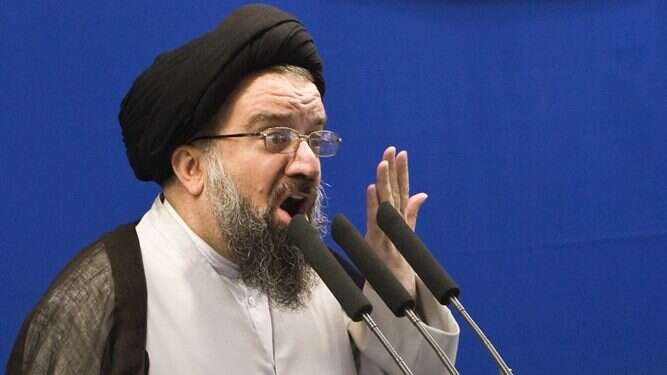A senior Iranian cleric said on Friday that if Israel acts "foolishly," Tel Aviv and Haifa would be destroyed, state TV reported.
"We will expand our missile capabilities despite western pressure [to curb it] ... to let Israel know that if it acts foolishly, Tel Aviv and Haifa will be totally destroyed," hard-line cleric Ahmad Khatami said during Friday prayers at Tehran University.
The remarks contradicted statements by Tehran, saying it has no interest in stoking tensions in the Middle East.
Following a particularly tense week of hostilities, Iranian President Hassan Rouhani struck a different tone on Thursday, saying Iran does not want "new tensions" in the Middle East.
"Iran has always sought to reduce tensions in the region, trying to strengthen security and stability," Rouhani said in a telephone call with German Chancellor Angela Merkel.
This was his first comment following Iran's missile attack on Israel and the IDF's devastating response overnight Wednesday.
In a statement Thursday, the regime in Tehran added: "Iran does not hold or operate military bases or weapons in Syria. The claims by the United States and Israel are false and are meant to justify the aggression against Syria."

The Syrian army issued a statement a short while later that "most of the missiles fired by Israel at infrastructure and military targets in our country were intercepted by the Syrian army's defense systems. The Syrian high command is prepared to contend with all forms of aggression and is committed to preventing any effort to support terrorist elements operating in Syria."
The Syrian military acknowledged that the strikes destroyed a radar station and an ammunition warehouse, and damaged a number of air defense units. It said three people were killed and two were wounded.
The Britain-based Syrian Observatory for Human Rights, which closely monitors the civil war through sources inside Syria, said 23 fighters, including five Syrian soldiers, among them one senior officer, were killed.
The Syrian army also claimed Israelis were fleeing the country en masse to escape the Syrian response.
"The Zionist regime [Israel] cannot withstand another attack like the one it sustained, and masses of Israelis are already flooding the international airport in Tel Aviv and fleeing Israel in fear of a harsh response from the great and powerful Syrian army," the statement said.
Senior regime officials, meanwhile, told Syrian state media outlets that "the Syrian army's rocket systems were able to embarrass the Israeli Iron Dome, which failed to intercept nine Syrian surface-to-surface missiles that hit military bases and intelligence facilities on the occupied Golan Heights and inflicted immense damage. Next time the Zionist enemy will think twice about attacking Syria because its response will be even stronger."
Iranian state media described the exchange of hostilities as a matter between Israel and Syria. Some reports highlighted claims made by a Syrian lawmaker that the Syrian army, not Iran, fired the missiles at the Golan Heights which led to the Israeli retaliation.
According to Iranian PressTV, most of the missiles fired by Israel were intercepted by Assad regime forces.
The White House swiftly condemned Iran's "provocative rocket attacks from Syria against Israeli citizens" and expressed strong support for "Israel's right to act in self-defense," while Russia said the Israeli strikes marked a dangerous escalation and urged both Israel and Iran to avoid provoking each other.
In a statement, White House press secretary Sarah Huckabee Sanders said "the Iranian regime's deployment into Syria of offensive rocket and missile systems aimed at Israel is an unacceptable and highly dangerous development for the entire Middle East."




